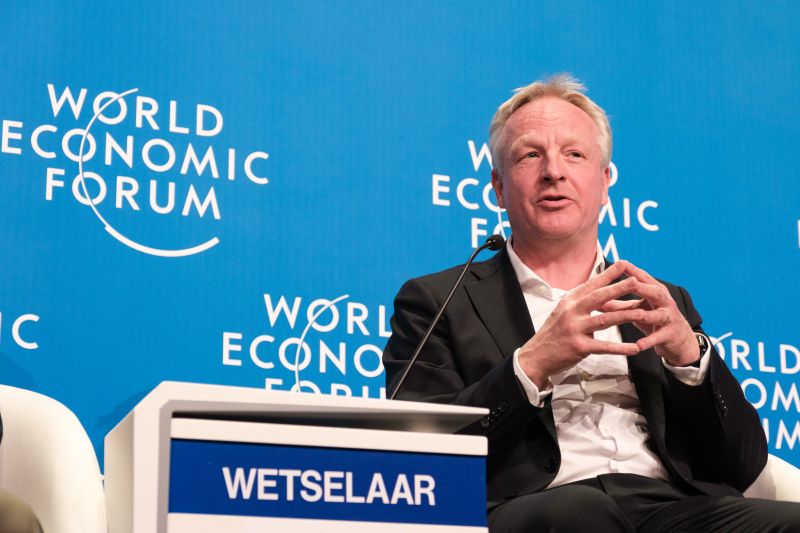Tuesday, January 24, 2023
Promoting collaboration between Africa and Europe, boosting investment, developing clean technologies and implementing the circular economy in all sectors are some of the issues that need to be addressed in order to move towards a more planet-friendly future.
The current energy crisis, resulting from a socio-economic context marked by the war in Ukraine and rising prices, has led to a different environmental landscape. On the one hand, the need to accelerate the energy transition towards a more sustainable and secure energy supply model has become apparent; on the other hand, renewable energies and new energies such as green hydrogen are emerging as the major tools to avoid not only dependence on fossil fuels, but also on certain influences.
But how do we achieve this transition? Should the urgency to achieve it at any price prevail? Do we have time to design a fair strategy for all of society? At the Open Forum: The Energy Transition Rush held during the Davos 2023 World Economic Forum in Switzerland, a panel of experts addressed these issues and how we can find clean and affordable energy solutions for all, in order to adapt to new variables from industrial production to domestic consumption.
In this colloquium, the participants agreed that security of supply is the fundamental pillar for guaranteeing access to energy for all economic levels and that, to this end, there must be a consolidated regulatory framework to protect this area. While it is true that unforeseen events can affect the company in unexpected ways, it is essential to have defined mechanisms of action to mitigate their effects. Moreover, within this concept of energy protection, diversification appears as a great ally to escape from dependence on a single material, which can lead us, for example, to resume the use of energy sources such as coal, a resource with more harmful effects on the environment.
In fact, according to the annual report of the International Energy Agency (IEA), high energy prices caused a huge transfer of wealth from consumers to producers, with levels similar to 2014 in the case of oil, but unprecedented in natural gas. In contrast, the costs of renewable energies have barely increased, underlining that this is a crisis where the energy transition is the solution, not the problem.
The two faces of diversification
In this regard, Egypt's Minister of International Cooperation, Rania Al-Mashat, stressed that the energy crisis cannot be measured by a single metric, as it "affects us in various ways": socially, economically and, of course, environmentally.
In her experience, "those who pollute the least are generally those who suffer the most from the consequences of climate change, as is the case in several African countries." For this reason, she considers it necessary to have a broader vision in order to find innovation mechanisms that take into account the particular characteristics of each area, since it will not be the same to act in developed countries as in developing countries, or in one with a desert climate as opposed to a Mediterranean one.

This theory is also supported by the CEO of the International Solar Alliance (ISA), Ajay Mathur, for whom the key is to think on a sectorial and seasonal basis. "The sun is available when it shines and the wind is available when it blows, that happens most of the time but not always, so we need to focus on storage technologies. When that happens, changes will come. Securing critical technology and materials is strategic," he said during his speech in Davos.
For his part, the CEO of Cepsa, Maarten Wetselaar, argued that "raising the price of carbon is one of the most effective tools" that can be used to encourage the commitment to renewable energies. Along with this proposal, he added the idea of incentivizing investments aimed at circularity, as he believes that achieving a sustainable production and consumption chain in all its links is positive.
He also warned of the need to avoid increasing inequality in the context of the energy transition. "A rapid transition can generate secondary problems. For example, leaving out families who cannot afford to buy electric cars because the price of electric cars is still high," he added.
This opened a debate on the speed of implementation and the needs of society, since new technologies generally require large investments, which translates into "a real cost of transition" that cannot be met by one sector alone. This opened a debate on the speed of implementation and the needs of society, since new technologies generally require large investments, which translates into "a real cost of transition" that cannot be met by one sector alone.
He also noted that "on the road to energy transformation, we need more cooperation and multilateral, active and inclusive communication, which does not leave out any relevant actor and prioritizes the needs of young people. Only in this way will we be able to help restore trust between blocks, curb geo-economic fragmentation and avoid culture shock, which is of particular concern in the long term."
Green careers to face the future
Climatologist Lauren Shum, who worked at the U.S. Department of Energy, argued in the conclusion of her speech that "more professionals in green studies careers" are needed, in an appeal to the younger generation to be willing to participate in this process and to contribute their ideas to the energy transition. Shum pointed out that the crisis "has had good things," such as greater awareness and concern in society about rising energy prices, which has increased the demand for alternatives.
"The opportunities right now are in developing countries, but here the inequity appears because most investments are going to developed countries," Schum commented. She also alluded to the consequences of capitalism as a system of massive and constant production, which forces the consumption of more resources and, therefore, can generate more pollution. The solution, according to the expert, is to balance growth with efficiency and to include circularity in the system; in other words, if the current trend is to change devices such as personal telephones every two or three years, the change involves building these devices with materials that we can then recycle and "bring back to the market."
Rania Al-Mashat insisted that now is the time to accelerate in renewable energies and take advantage of the crisis as a catalyst to improve partnerships between Africa and Europe, from where a great atmosphere of investment aimed at respecting the environment should emerge. The zero emissions scenario for 2050 remains an ambitious but, according to experts, still achievable challenge. To this end, it is necessary to implement urgent and coherent tools that respond to the challenges of energy security and diversification of consumption, in order to mitigate the adverse effects of climate change.
¿Te ha parecido interesante?





